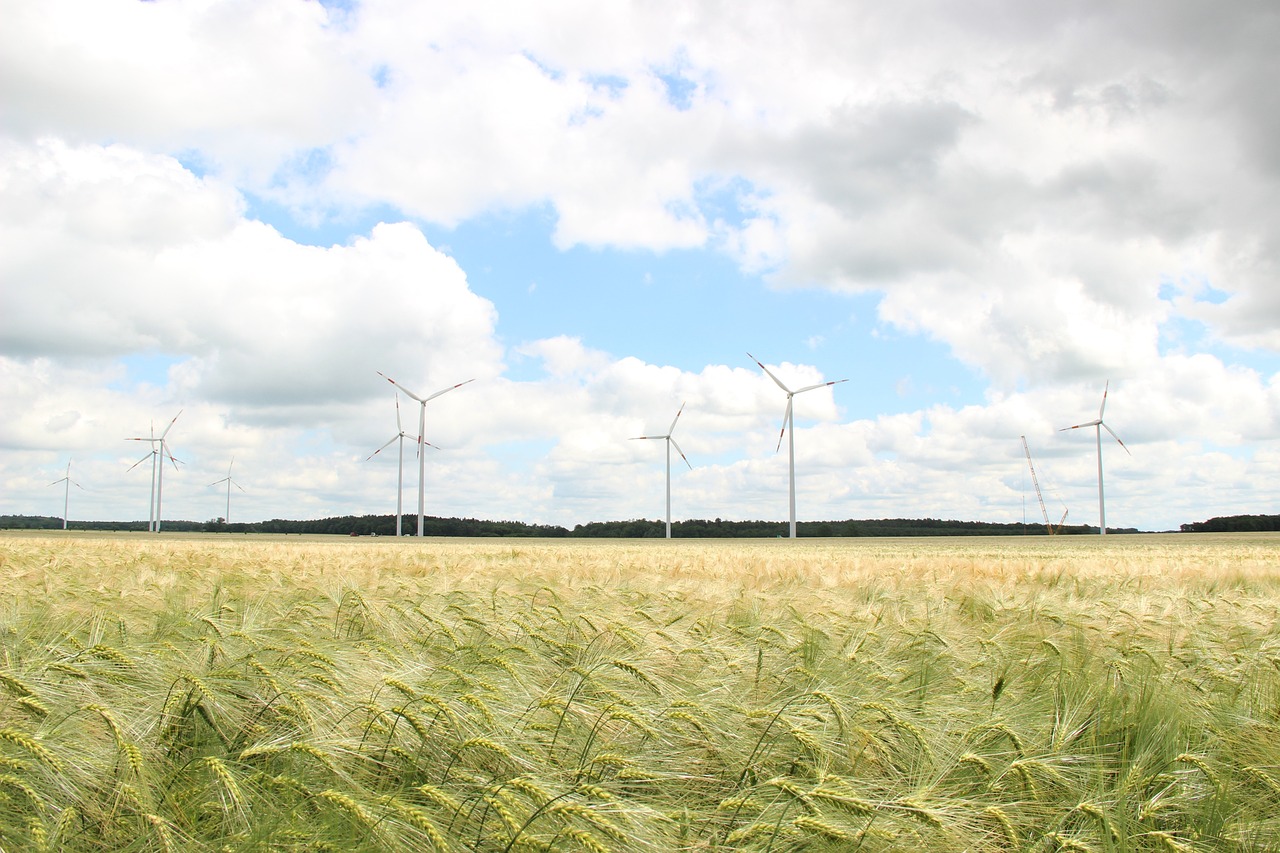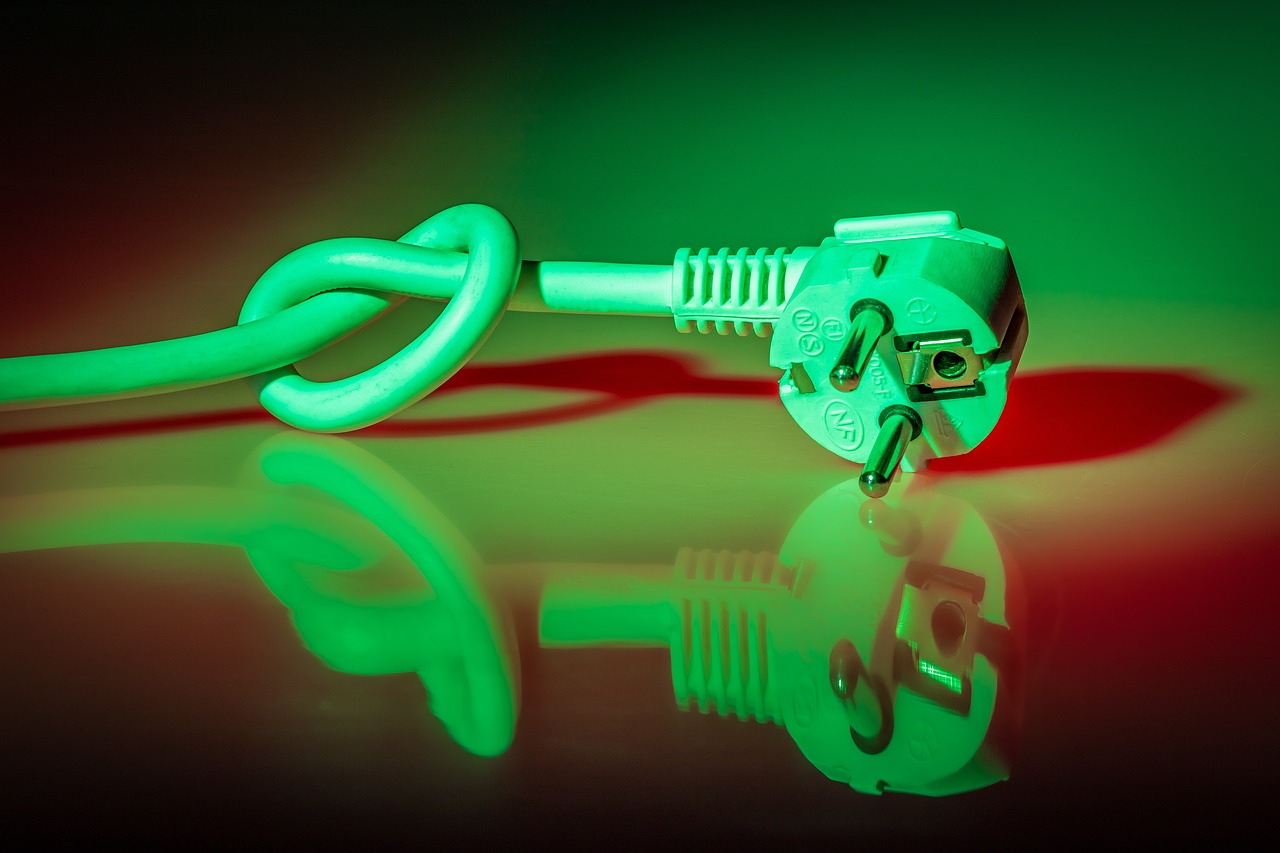The Correlation between Green Energy and Financial Performance
In today's rapidly changing world, the conversation around green energy is more than just a trend; it's a movement that businesses cannot afford to ignore. The relationship between adopting green energy practices and financial performance is becoming increasingly evident, with numerous studies and real-world examples illustrating how going green can lead to significant financial benefits. As organizations grapple with the implications of climate change, regulatory pressures, and shifting consumer preferences, the adoption of sustainable energy solutions is not merely a moral imperative but a strategic business decision. This article delves into the various dimensions of this correlation, exploring how green energy initiatives can enhance financial outcomes for companies across different sectors.
The surge in investments in green energy is not just a passing fad; it's a fundamental shift in how businesses operate. Factors driving this change include an increasing awareness of environmental issues, technological advancements, and a growing demand for sustainable practices from consumers. According to recent reports, global investments in renewable energy reached a staggering $500 billion in 2022, reflecting a commitment to sustainability that is reshaping the financial landscape. Companies that embrace this trend are not only contributing to a healthier planet but are also positioning themselves for enhanced financial performance. The implications for various sectors are profound, as businesses that invest in green technologies can expect to see improvements in efficiency, cost savings, and ultimately, profitability.
Adopting green energy initiatives can significantly enhance a company's reputation. In an era where consumers are more informed and concerned about sustainability, businesses that prioritize environmental responsibility are likely to see improved customer loyalty. This shift is not merely about being seen as "eco-friendly"; it's about creating a brand identity that resonates with values of sustainability and ethics. Companies like Tesla have shown that a strong commitment to green energy can foster a loyal customer base willing to pay a premium for products that align with their values. Over time, the financial benefits of such loyalty can be substantial, leading to increased sales and market share.
The growing consumer demand for sustainable practices is reshaping purchasing decisions across the board. Today’s consumers are not just looking for products; they are seeking brands that reflect their values. A recent survey revealed that 75% of consumers are willing to change their shopping habits to reduce environmental impact. This trend illustrates a clear connection between sustainability efforts and financial outcomes for companies. As businesses align their offerings with consumer preferences, they can expect to see a positive impact on their bottom line. In this context, investing in green energy is not just an ethical choice; it's a smart business strategy.
When companies demonstrate a strong commitment to sustainability, they cultivate trust among consumers. This trust translates into brand loyalty, which is invaluable in today's competitive marketplace. Consider the impact of a brand that actively promotes its green initiatives: consumers are more likely to return, recommend, and advocate for such brands. This loyalty can lead to a multiplier effect on financial performance, as loyal customers often contribute to higher sales and reduced marketing costs. In essence, sustainability becomes a key driver of brand equity.
Companies that prioritize green energy can gain significant competitive advantages in the market. By differentiating themselves as leaders in sustainability, they can attract a niche market of environmentally conscious consumers. This positioning not only enhances brand value but also opens up new revenue streams. For instance, businesses that invest in renewable energy sources can market their products as eco-friendly, appealing to a growing demographic that prioritizes sustainability. In this way, green energy initiatives serve as a catalyst for innovation and market differentiation.
Government incentives and regulations play a crucial role in encouraging green energy adoption. Many countries offer tax credits, grants, and subsidies to businesses that invest in renewable energy technologies. These incentives can significantly reduce the financial burden associated with transitioning to green energy, making it a more attractive option for companies. For example, a company that installs solar panels can benefit from tax credits that offset installation costs, leading to improved financial performance. By understanding and leveraging these incentives, businesses can enhance their profitability while contributing to a sustainable future.
Transitioning to green energy solutions often results in substantial cost savings for companies. By utilizing renewable energy sources, businesses can reduce their dependence on fossil fuels, leading to lower energy bills and operational costs. Moreover, energy-efficient practices can minimize waste and optimize resource usage, further enhancing financial performance. For example, companies that implement energy-saving technologies can see a reduction in their energy consumption by 20-30%, translating to significant savings over time. These cost reductions not only improve the bottom line but also free up resources for reinvestment in other areas of the business.
Investing in renewable energy sources offers long-term financial advantages that extend beyond immediate savings. Companies that prioritize green energy are likely to experience increased profitability as they reduce operational costs and enhance efficiency. Over time, the cumulative effect of these investments can lead to a stronger financial position, enabling businesses to withstand market fluctuations and economic downturns. Additionally, as the global demand for sustainable practices continues to rise, companies that have established themselves as green leaders will likely reap the benefits of a growing market.
Despite the numerous benefits, there are challenges and risks associated with green energy investments. Initial costs can be high, and market volatility can pose risks to financial performance. Companies must navigate these challenges carefully, weighing the potential long-term benefits against the upfront investment. Understanding the landscape and planning strategically can mitigate these risks, allowing businesses to capitalize on the opportunities presented by green energy. As the market evolves, staying informed and adaptable will be crucial for companies looking to thrive in this new era of sustainability.
- What are the primary benefits of adopting green energy? Adopting green energy can lead to cost savings, enhanced corporate reputation, and improved customer loyalty.
- Are there financial incentives for businesses to go green? Yes, many governments offer tax credits and subsidies for companies that invest in renewable energy.
- How does consumer demand impact green energy investments? Growing consumer preferences for sustainability can drive companies to adopt green practices, leading to better financial outcomes.
- What challenges do businesses face when transitioning to green energy? Initial costs and market volatility are significant challenges that companies must navigate when investing in green energy.

The Rise of Green Energy Investments
The landscape of energy production is undergoing a seismic shift, and at the heart of this transformation lies **green energy investments**. As businesses and governments worldwide grapple with the pressing realities of climate change, the surge in investments towards renewable energy sources like solar, wind, and hydroelectric power is not just a trend—it's a necessity. A multitude of factors is driving this shift, including technological advancements, regulatory pressures, and an increasingly eco-conscious consumer base. This growing commitment to sustainability is not merely about doing the right thing; it’s also about securing a **competitive edge** in an evolving market.
One of the primary catalysts for the rise in green energy investments is the **declining cost of renewable technologies**. Over the past decade, the price of solar panels and wind turbines has plummeted, making them not only viable alternatives but often cheaper than traditional fossil fuels. According to a recent report, the cost of solar energy has decreased by approximately **89%** since 2009. This dramatic reduction has made it feasible for companies to invest in renewable energy without breaking the bank. As a result, businesses are increasingly recognizing that going green can also mean going **green in their finances**.
Moreover, the **global push for sustainability** is being reinforced by regulatory frameworks and policies that incentivize green energy investments. Governments are implementing **tax incentives**, grants, and subsidies to encourage businesses to transition to renewable energy sources. For instance, in the United States, the federal Investment Tax Credit (ITC) allows companies to deduct a significant percentage of their solar installation costs from their federal taxes. Such incentives not only lower the initial investment barrier but also enhance the overall **return on investment (ROI)** for businesses embracing green energy.
However, it's not just about the numbers. The **social implications** of investing in green energy are profound. Companies that prioritize sustainability often find themselves at the forefront of a burgeoning market segment that values ethical practices. As consumers become more aware of environmental issues, their purchasing decisions are increasingly influenced by a company's commitment to sustainability. This shift in consumer behavior is compelling businesses to rethink their energy strategies, aligning them with **green initiatives** to attract and retain customers.
In summary, the rise of green energy investments is not just a fleeting trend; it’s a fundamental shift in how businesses operate and compete. By embracing renewable energy, companies can leverage cost savings, enhance their reputations, and position themselves favorably in a market that increasingly rewards sustainability. As we look to the future, it’s clear that green energy investments will play a pivotal role in shaping the financial performance of businesses across various sectors.

Impact on Corporate Reputation
In today's fast-paced world, a company's reputation can make or break its success. With the increasing emphasis on sustainability, the adoption of green energy initiatives has become a crucial factor in shaping corporate reputation. When businesses embrace environmentally friendly practices, they send a clear message that they care about more than just profits; they care about the planet and future generations. This commitment can significantly enhance their public image, leading to a ripple effect of benefits that extend beyond mere financial metrics.
One of the most compelling aspects of adopting green energy is its ability to foster customer loyalty. Consumers are becoming more discerning, often opting to support brands that align with their values. A recent study revealed that over 70% of consumers are willing to pay more for products from companies committed to sustainability. This shift in consumer behavior underscores the importance of integrating green practices into business models—not just as a trend, but as a fundamental aspect of corporate identity.
Moreover, the positive impact on corporate reputation can lead to enhanced brand loyalty and trust. When a company takes a stand on environmental issues, it cultivates a sense of community among its customers. This connection can be likened to a friendship; just as we trust our friends to act in our best interests, consumers are more likely to trust brands that demonstrate a genuine commitment to sustainability. In fact, companies that prioritize green energy often experience a significant increase in customer retention rates, as loyal customers are less likely to switch to competitors.
Furthermore, the competitive landscape favors those who are proactive about their environmental impact. Companies that prioritize green energy initiatives often find themselves in a unique position to differentiate themselves in the market. By showcasing their commitment to sustainability, they can attract a niche audience that values eco-friendly practices. This not only enhances their market positioning but also opens doors to new opportunities, such as partnerships with other like-minded organizations or access to exclusive markets.
However, it's essential to acknowledge that the journey towards green energy adoption isn't without its challenges. While the benefits of improved corporate reputation are clear, companies must also navigate potential pitfalls, such as the initial costs of transitioning to sustainable practices. Nevertheless, the long-term gains—both financially and reputationally—often outweigh these challenges. As businesses continue to embrace green energy, they not only contribute to a healthier planet but also solidify their standing as leaders in their respective industries.
In summary, the impact of adopting green energy on corporate reputation is profound and multifaceted. Companies that commit to sustainability are not just enhancing their image; they are building lasting relationships with their customers, gaining competitive advantages, and paving the way for a more sustainable future. As we move forward, the question remains: will your company take the leap into the green energy revolution?
- How does adopting green energy improve corporate reputation?
Adopting green energy demonstrates a company's commitment to sustainability, which resonates with environmentally conscious consumers, leading to increased trust and loyalty.
- What are the financial benefits of a strong corporate reputation?
A strong reputation can lead to higher sales, customer retention, and potentially lower costs associated with marketing and customer acquisition.
- Are there risks associated with transitioning to green energy?
Yes, initial costs and market volatility can pose challenges; however, the long-term benefits often outweigh these risks.

Consumer Preferences for Sustainability
In today's world, consumers are becoming increasingly aware of the environmental impact of their choices. This shift in mindset is not just a fad; it's a fundamental change in how people perceive brands and products. As more individuals prioritize sustainability, companies are finding that their financial performance is closely tied to their commitment to green practices. Have you ever considered how your purchasing decisions are influenced by a brand's environmental footprint? It's a question worth pondering, especially as studies show that a significant portion of consumers are willing to pay more for products that are eco-friendly.
According to recent surveys, approximately 66% of global consumers are willing to pay more for sustainable brands. This statistic underscores a powerful trend: sustainability is not just a buzzword; it’s becoming a critical factor in purchasing decisions. In fact, the Millennial and Gen Z generations are leading the charge, with many actively seeking out brands that demonstrate a genuine commitment to environmental responsibility. This trend is reshaping the market landscape, compelling companies to rethink their strategies and invest in sustainable practices.
Moreover, the relationship between consumer preferences and sustainability can be likened to a ripple effect. When one company adopts green practices, it sets a precedent that others may follow. This interconnectedness can create a competitive environment where sustainability becomes a key differentiator. For instance, brands that embrace eco-friendly packaging, renewable energy sources, or sustainable sourcing can attract a loyal customer base that values ethical consumption.
To illustrate this point further, consider the following table that highlights consumer preferences for sustainability:
| Consumer Demographic | Willingness to Pay More | Preferred Sustainable Practices |
|---|---|---|
| Millennials | 73% | Eco-friendly packaging, renewable energy |
| Gen Z | 75% | Sustainable sourcing, carbon neutrality |
| Baby Boomers | 55% | Recyclable materials, ethical labor practices |
As you can see, younger generations are particularly driven by sustainability, making it crucial for businesses to align their practices with these values. However, it’s not just about meeting consumer expectations; it’s also about building a brand that resonates with the growing desire for transparency and accountability. Companies that can effectively communicate their sustainability efforts often find that they not only attract new customers but also retain existing ones.
In conclusion, as consumer preferences continue to evolve towards sustainability, businesses must adapt to this new landscape. The financial implications are clear: companies that embrace sustainable practices are likely to see improved customer loyalty, enhanced brand reputation, and ultimately, better financial performance. So, the next time you’re shopping, think about how your choices impact the planet and the brands you support. Are you ready to make a difference with your purchasing power?
- What are the main factors driving consumer preferences for sustainability?
Consumers are increasingly aware of environmental issues, leading them to prefer brands that demonstrate eco-friendly practices. - How does sustainability impact brand loyalty?
Brands that commit to sustainable practices often foster greater trust and loyalty among consumers. - Are younger consumers more inclined to support sustainable brands?
Yes, Millennials and Gen Z are particularly driven by sustainability, often willing to pay more for eco-friendly products. - What financial benefits can companies expect from adopting sustainable practices?
Companies can experience increased customer loyalty, improved brand reputation, and potential cost savings through energy efficiency.

Brand Loyalty and Trust
In today's fast-paced market, where consumers are bombarded with choices, brand loyalty has become a precious commodity. Companies that embrace green energy initiatives not only contribute positively to the environment but also cultivate a deeper sense of trust and loyalty among their customers. Imagine walking into a store and seeing a brand that proudly displays its commitment to sustainability; it instantly resonates with eco-conscious consumers, doesn't it? This connection often translates into a willingness to choose that brand over others, even if it means paying a little more.
Research shows that consumers are increasingly prioritizing sustainability when making purchasing decisions. A recent survey indicated that over 70% of consumers prefer brands that demonstrate a commitment to environmental responsibility. This statistic highlights the growing trend where consumers are not just looking for quality products, but also for brands that align with their values. When a company takes substantial steps towards green energy, it sends a message that they care about the planet and the future, which can significantly enhance their brand image.
Moreover, the relationship between sustainability efforts and brand loyalty is cyclical. As companies invest in green practices, they not only improve their operational efficiency but also engage in transparent communication with their customers. This transparency builds trust. When customers feel informed and involved in a brand's sustainability journey, they are more likely to become repeat buyers. In essence, investing in green energy is not just about reducing carbon footprints; it's about building a community of loyal customers who feel a connection to the brand.
To further illustrate this point, consider the following table that showcases the impact of sustainability on brand perception:
| Brand Action | Consumer Perception | Impact on Loyalty |
|---|---|---|
| Adopting Renewable Energy | Positive | Increased |
| Transparent Sustainability Reporting | Trustworthy | Stronger |
| Community Engagement in Environmental Initiatives | Responsible | Enhanced |
In conclusion, the journey towards sustainability is not just a trend; it's a fundamental shift in how brands operate and connect with their audience. By prioritizing green energy, companies can create a robust framework for brand loyalty and trust, ensuring they not only survive but thrive in an increasingly competitive marketplace. As consumers continue to demand more from the brands they support, those that lead with sustainability will undoubtedly reap the rewards.
- How does green energy impact brand loyalty? Green energy initiatives resonate with eco-conscious consumers, fostering trust and encouraging repeat purchases.
- Are consumers willing to pay more for sustainable products? Yes, many consumers prioritize sustainability and are often willing to pay a premium for brands that align with their values.
- What are the long-term benefits of adopting green energy? Long-term benefits include reduced operational costs, enhanced brand reputation, and increased customer loyalty.

Market Positioning Advantages
In today's competitive landscape, companies are constantly seeking ways to differentiate themselves. One of the most effective ways to achieve this is by embracing green energy initiatives. By positioning themselves as environmentally responsible, businesses can tap into a growing market of eco-conscious consumers. This isn't just about being trendy; it's about establishing a brand identity that resonates with the values of a significant segment of the population. When companies prioritize sustainability, they create a unique selling proposition that can set them apart from competitors who may still rely on traditional energy sources.
Furthermore, adopting green energy practices can enhance a company's overall market positioning. For instance, organizations that utilize renewable energy sources often find themselves in a better light when it comes to stakeholder engagement. Investors and customers alike are increasingly scrutinizing corporate sustainability efforts. A company that showcases its commitment to green practices can attract not only customers but also investors who are keen on supporting businesses with a sustainable vision. This shift in investor behavior underscores the importance of aligning financial goals with environmental responsibility.
Additionally, companies that invest in green energy can benefit from enhanced brand visibility. As media coverage surrounding climate change and sustainability grows, businesses that actively participate in green initiatives are more likely to receive positive attention. This can lead to increased brand recognition, which is vital in a crowded market. For example, a company that installs solar panels or invests in wind energy can leverage these efforts in their marketing campaigns, showcasing their commitment to sustainability. This not only attracts customers but also solidifies their reputation as a forward-thinking brand.
Moreover, the competitive edge gained through green energy adoption can translate into tangible financial benefits. Companies that are seen as leaders in sustainability often enjoy a loyal customer base willing to pay a premium for their products or services. A recent study found that over 70% of consumers are willing to change their purchasing habits to reduce environmental impact. This statistic highlights the potential for increased sales and profitability for businesses that align their operations with the values of their customers.
To further illustrate the market positioning advantages, consider the following table that outlines key benefits:
| Advantage | Description |
|---|---|
| Enhanced Brand Image | Positioning as a leader in sustainability increases brand trust and loyalty. |
| Attracting Investment | Investors are increasingly favoring companies with strong sustainability practices. |
| Consumer Loyalty | Eco-conscious consumers are more likely to remain loyal to brands that prioritize green practices. |
| Competitive Differentiation | Stand out in a crowded market through unique sustainable offerings. |
In conclusion, the market positioning advantages gained from adopting green energy practices are not merely superficial; they are deeply embedded in the fabric of modern business strategy. Companies that embrace sustainability not only enhance their reputation but also secure a strategic advantage that can drive long-term financial success. As the world continues to shift towards more sustainable practices, those who adapt will likely find themselves leading the charge, reaping the rewards of their foresight.
- What are the primary benefits of adopting green energy? The main benefits include enhanced brand reputation, increased customer loyalty, and potential cost savings.
- How can green energy initiatives impact financial performance? By reducing operational costs and attracting eco-conscious consumers, businesses can improve their bottom line.
- Are there any risks associated with investing in green energy? Yes, initial costs can be high, and there may be market volatility, but the long-term benefits often outweigh these challenges.
- How can companies effectively market their green energy initiatives? By showcasing their sustainability efforts through marketing campaigns and emphasizing their commitment to the environment, companies can attract more customers.

Regulatory and Tax Incentives
When it comes to adopting green energy practices, regulatory and tax incentives play a crucial role in shaping the landscape for businesses. Governments worldwide are increasingly recognizing the importance of sustainability, and as a result, they are implementing policies that not only promote the use of renewable energy sources but also provide financial relief to companies making the shift. This creates a win-win situation, where businesses can enhance their financial performance while contributing to a healthier planet.
One of the most significant incentives is the availability of tax credits for companies that invest in renewable energy technologies. These credits can substantially reduce tax liabilities, making it more financially viable for businesses to transition to green energy. For instance, the Investment Tax Credit (ITC) in the United States allows businesses to deduct a significant percentage of the cost of installing solar energy systems from their federal taxes. This can lead to substantial savings, which can be redirected towards other operational needs or further investments in sustainability.
Moreover, regulatory frameworks often include grants and subsidies aimed at encouraging companies to adopt green technologies. These financial incentives can cover a portion of the initial investment costs associated with renewable energy projects. For example, many governments offer grants for energy efficiency upgrades or renewable energy installations, which can significantly lower the barrier to entry for businesses looking to make the switch. Such programs not only alleviate financial pressures but also encourage innovation and competitiveness in the marketplace.
In addition to tax breaks and grants, businesses can also benefit from lower energy costs through the implementation of green energy solutions. By investing in renewable energy, companies can reduce their reliance on fossil fuels, which are subject to market volatility and fluctuating prices. In contrast, renewable energy sources like wind and solar often have lower operational costs once the initial investment is made. This shift not only stabilizes energy expenses but also enhances long-term profitability.
It's essential to note that these incentives can vary significantly by region and sector. For instance, some industries may face stricter regulations that mandate a transition to greener practices, while others might benefit from more lenient guidelines that allow for gradual changes. Understanding these nuances is crucial for businesses as they navigate the regulatory landscape and seek to optimize their financial performance through green energy initiatives.
In summary, the combination of regulatory support and tax incentives creates a fertile ground for businesses to invest in green energy. By taking advantage of these opportunities, companies can not only improve their financial performance but also position themselves as leaders in sustainability, ultimately benefiting from enhanced reputation and customer loyalty.
- What types of tax incentives are available for green energy investments? Tax incentives can include credits, deductions, and grants aimed at reducing the costs associated with renewable energy projects.
- How can green energy initiatives improve a company's financial performance? By reducing energy costs and taking advantage of government incentives, companies can improve their bottom line while enhancing their market position.
- Are there risks associated with relying on government incentives for green energy? Yes, changes in government policy can impact the availability of incentives, so it’s essential for businesses to stay informed and adaptable.

Cost Savings through Energy Efficiency
In today's fast-paced business world, cost savings are more crucial than ever. One of the most effective ways for companies to achieve these savings is through energy efficiency. Transitioning to green energy solutions not only helps the environment but also significantly boosts a company's bottom line. Imagine cutting down on utility bills while simultaneously contributing to a sustainable future—it's a win-win situation! By implementing energy-efficient practices, businesses can reduce their energy consumption, leading to lower operational costs and increased profitability.
So, how does this all work? Let's break it down. When companies invest in energy-efficient technologies, such as LED lighting, high-efficiency HVAC systems, or smart energy management systems, they can drastically reduce their energy usage. For instance, switching to LED lighting can cut energy consumption by up to 75% compared to traditional incandescent bulbs. This reduction not only lowers electricity bills but also extends the lifespan of lighting systems, resulting in less frequent replacements and maintenance costs.
Moreover, energy efficiency isn't just about the immediate savings; it also has long-term financial benefits. According to a recent study, businesses that adopt energy-efficient technologies can save an average of $0.50 to $1.00 per square foot annually. Over time, these savings can accumulate into substantial amounts, allowing companies to reinvest in other areas of their business, whether it's expanding their product line or enhancing employee benefits.
Additionally, energy-efficient practices can also qualify businesses for various incentives and rebates offered by governments and utility companies. These financial incentives can help offset the initial costs of implementing energy-efficient solutions, making it easier for companies to adopt these practices without straining their budgets. For example, many states offer tax credits for businesses that invest in renewable energy sources, further enhancing the financial viability of going green.
However, it's important to note that the transition to energy efficiency does come with its challenges. Initial investments can be significant, and businesses must carefully evaluate the return on investment (ROI) for energy-efficient upgrades. Nevertheless, the long-term benefits often outweigh these initial costs, making it a smart financial decision in the grand scheme of things.
In conclusion, the correlation between energy efficiency and cost savings is undeniable. By making the switch to green energy solutions, businesses can not only reduce their operational costs but also position themselves as leaders in sustainability. It's a strategic move that not only pays off financially but also enhances a company's reputation in an increasingly eco-conscious market.
- What are the main benefits of energy efficiency? Energy efficiency leads to lower energy bills, reduced environmental impact, and potential government incentives.
- How can businesses finance energy-efficient upgrades? Many businesses can take advantage of tax credits, rebates, and financing options available through local and federal programs.
- Are there any risks associated with transitioning to energy-efficient technologies? The primary risk is the initial investment cost, but the long-term savings typically outweigh these initial expenses.

Long-term Financial Benefits
Investing in green energy isn't just a fleeting trend; it's a strategic decision that can yield significant long-term financial benefits for businesses. By transitioning to renewable energy sources, companies can not only contribute to environmental sustainability but also enhance their financial health in a multitude of ways. For starters, the initial investment in green technologies often leads to reduced operational costs over time. Imagine slashing your energy bills by utilizing solar panels or wind turbines; that's money that can be redirected towards innovation, employee salaries, or marketing efforts.
Moreover, the stability of energy costs associated with renewable sources is a game changer. Unlike fossil fuels, which are subject to volatile market fluctuations, renewable energy prices tend to be more predictable. This predictability allows companies to budget more effectively and reduces the risk of unexpected expenses that can derail financial plans. To illustrate this point, consider the following table comparing traditional energy costs versus renewable energy costs over a decade:
| Year | Traditional Energy Cost (USD) | Renewable Energy Cost (USD) |
|---|---|---|
| 1 | 100,000 | 90,000 |
| 5 | 120,000 | 70,000 |
| 10 | 150,000 | 50,000 |
This table highlights a clear trend: as time progresses, the costs associated with traditional energy sources escalate, while those for renewable energy sources decline. This not only enhances profitability but also provides a competitive edge in pricing strategies. Additionally, companies that invest in green energy often find themselves eligible for various government incentives and tax breaks, further improving their financial outlook. These incentives can significantly offset the initial costs of transitioning to renewable energy, making it an attractive option for businesses of all sizes.
Furthermore, the long-term financial benefits extend beyond mere cost savings. Companies that adopt sustainable practices often experience an increase in brand equity. As consumers become more environmentally conscious, they are more likely to support brands that align with their values. This can translate into increased sales and a loyal customer base, as consumers tend to gravitate towards businesses that demonstrate a commitment to sustainability. In fact, studies have shown that companies with strong sustainability practices often outperform their competitors financially.
In conclusion, the long-term financial benefits of adopting green energy practices are multifaceted and compelling. From reducing operational costs and stabilizing energy prices to enhancing brand loyalty and accessing government incentives, the advantages are clear. As businesses navigate the evolving landscape of environmental responsibility, those that embrace green energy will not only contribute to a healthier planet but also secure a more prosperous future.
- What are the main long-term financial benefits of green energy? The primary benefits include reduced operational costs, stable energy prices, government incentives, and increased brand loyalty, all of which contribute to improved profitability.
- How does investing in green energy affect a company's reputation? Companies that invest in green energy often enhance their reputation, leading to increased customer loyalty and trust, which can positively impact sales.
- Are there risks associated with transitioning to green energy? Yes, there can be initial costs and market volatility, but the long-term benefits often outweigh these risks.

Challenges and Risks
The journey towards adopting green energy is not without its challenges and risks. While the benefits are numerous, businesses often find themselves navigating a complex landscape filled with uncertainties. One of the most significant hurdles is the initial investment cost. Transitioning to renewable energy sources—such as solar, wind, or bioenergy—often requires substantial upfront capital. This can be a daunting prospect for small to medium-sized enterprises (SMEs) that may already be operating on tight budgets. Imagine trying to leap over a large chasm; without the right support, the fall can be devastating.
Moreover, the market volatility associated with renewable energy can pose a risk to financial performance. Prices for renewable technologies can fluctuate due to various factors, including technological advancements and changes in government policies. For instance, if a company invests heavily in solar panels today, but the price of solar technology drops significantly next year, that investment could quickly lose value. This uncertainty can make it challenging for businesses to forecast their financial outcomes accurately.
Another challenge lies in the regulatory landscape. While many governments are encouraging green energy through incentives, the rules can be complex and vary significantly from one region to another. Companies must stay informed about local, state, and federal regulations, which can change frequently. A sudden shift in policy can impact a company's green energy strategy, leading to unexpected costs or operational adjustments. To illustrate, consider a company that has invested in wind energy based on a specific tax incentive; if that incentive is removed, the financial viability of the project could be jeopardized.
Additionally, there are operational risks associated with the integration of green technologies. Businesses may face challenges in terms of technology adoption, maintenance, and employee training. For example, if a company switches to electric vehicles for its fleet but lacks the necessary infrastructure for charging stations, it could face logistical nightmares that hinder productivity. It’s like trying to drive a car without knowing where the gas stations are—eventually, you’re going to run out of fuel.
Lastly, it’s essential to consider the public perception of green energy investments. While many consumers appreciate sustainability efforts, there can also be skepticism. If a company promotes itself as eco-friendly but fails to deliver on its promises, it risks damaging its reputation. This could lead to a loss of customer trust and, ultimately, a decline in sales. In the age of social media, where information spreads like wildfire, a single misstep can have lasting repercussions.
In summary, while the transition to green energy is a noble and necessary endeavor, businesses must approach it with caution. By understanding and preparing for these challenges and risks, companies can better position themselves for long-term success in a rapidly evolving market.
- What are the main challenges businesses face when adopting green energy?
Businesses often encounter initial investment costs, market volatility, regulatory complexities, operational risks, and public perception issues.
- How can companies mitigate the risks associated with green energy investments?
Companies can conduct thorough market research, stay informed about regulatory changes, and implement a robust training program for employees to adapt to new technologies.
- Are there financial incentives for businesses to adopt green energy?
Yes, many governments offer tax credits, grants, and subsidies to encourage businesses to invest in renewable energy sources.
Frequently Asked Questions
- What is green energy?
Green energy refers to energy derived from renewable, natural sources that are environmentally friendly, such as solar, wind, and hydroelectric power. Unlike fossil fuels, green energy has a minimal negative impact on the planet, making it a sustainable choice for the future.
- How does adopting green energy impact a company's financial performance?
Adopting green energy can lead to significant cost savings through reduced energy expenses and potential tax incentives. Moreover, companies that embrace sustainability often see improved brand loyalty and a stronger market position, which can positively influence their financial outcomes.
- Are there any government incentives for businesses to switch to green energy?
Yes! Many governments offer various incentives, such as tax credits, grants, and rebates, to encourage businesses to invest in green energy solutions. These incentives can significantly offset initial costs and enhance financial performance over time.
- What are the long-term financial benefits of investing in renewable energy?
Investing in renewable energy can lead to long-term financial benefits, including lower operational costs, increased profitability, and a more resilient business model. Companies often find that the initial investment pays off through reduced energy bills and enhanced sustainability practices.
- What challenges might a company face when transitioning to green energy?
Transitioning to green energy can come with challenges, such as high initial costs, market volatility, and the need for new technologies. However, many businesses find that overcoming these challenges is worthwhile due to the long-term financial and environmental benefits.
- How do consumer preferences affect a company's decision to adopt green energy?
Consumer preferences are increasingly leaning towards sustainability, with many customers willing to support brands that prioritize eco-friendly practices. This shift can impact purchasing decisions and ultimately drive financial success for companies that embrace green energy.
- Can green energy initiatives improve a company's reputation?
Absolutely! Companies that adopt green energy initiatives often see enhanced reputations, leading to increased customer loyalty and trust. A strong commitment to sustainability can differentiate a brand in a crowded market, positively influencing its financial performance.



















